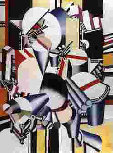

for the Sake of the Future
- The World Situation: Brief Outline of its Main Features and Prospects
The world is undergoing vast changes. In the decade following the breakup of the Soviet Union, the disintegration of the Eastern Bloc, and the end of the Cold War, the world's political and economic systems have faced expansion and collapse, upheavals and crises--violent and nonviolent--leading to a new global economy and new relationships of power and influence.
These conditions set the contours for progressive change in our time, change in the direction of expanded human rights and participatory democracy, of equity and equal rights among nations and peoples, of scientific and technological revolution, and of growing economic and social justice for all.
The same conditions have also heightened reactionary change, unleashing new dangers and realities of war and repression, of increasing global inequality, of terrorism and weapons of mass destruction, of mass movements of religious fanaticism and intolerance, of ecological devastation and the globalized plunder of the weak by the strong.
All those seriously interested in developing a road forward for progressive movements must take stock of these conditions. They must assess the balances of various forces, estimate rising and declining trends, and identify adversaries and allies. Here are a few of the main features we consider most significant:
--The Emergence of a Global Capitalist Class. Brought into being by the revolution in the technical means of production and communication, these transnational capitalists have fostered a truly global market and division of labor. Even though global capital has emerged in all the major countries, its firms and institutions are not decisively tied to any particular nationality or profess complete allegiance to any particular nation-state. This causes them to both collude and contend with the more traditional national forms of capital in each country and across national boundaries. Through a variety of global forums, this sector of global capital is seeking to bring into being new forms of global governance, security, trade and development that can work to their advantage and enhance their growth and prosperity.
--The Emergence of a Multipolar World. Because of its overwhelming technical and military superiority, the current White House and many other ruling elite groupings think the U.S. is the epicenter and enforcer of a "unipolar" or "one superpower" world. This is a one-sided and dangerous delusion. It ignores the economic power of the Globalists in Europe and East Asia. It both discounts and demonizes the dynamic power and growth of People's China. It views the third world generally as an object of history, rather that as makers of history. And it underestimates the world's peoples themselves, who, in creating forms of mass mobilization and participation, such as the recent movements critical of globalization and war, become "another superpower" in their own right.
--The Emergence of Global Crises and a Widening North-South Divide. The world's economic systems are becoming increasingly interdependent, and their problems cross borders and continents as well as their wealth, goods, and laboring peoples. All economic systems, moreover, are subsets of the Earth's ecosystem. There is no place in a truly modern economic theory for treating problems of pollution and other ills as "externalities" that can be discounted. Moreover, growing numbers of problems cannot be solved within national boundaries, but require bilateral and multilateral agreements and plans based on equitable and sustainable development. Ignoring these issues and stifling progressive change has given rise to the worldwide protests against the destructive downside of globalization. The centuries-old transfer of wealth from the poorer regions of the Global South to the advanced industrial North must cease and be redirected for the mutual benefit of all peoples.
--The Emergence of Open Hegemonism in the U.S Ruling Elite. The U.S. ruling class has regrouped into two main camps, the Globalists and the Hegemonists. The first is tied mainly to the global capitalists and primarily seeks to dominate through multilateral, multinational arrangements for world stability, governance, and security. The second, more reactionary and dangerous at present, also seeks global rule and stability, but now openly talks of Empire, the American Century, Pax Americana, preventive and pre-emptive war, and the military subordination of all other potential rival powers far into the future. It has taken the reactionary crimes of 9/11 as an excuse for an endless state of war abroad, an assault on civil liberties at home, and for plundering the country's wealth, and the wealth of others, for the permanent feeding of its war machine.
--The Emergence of Theocratic Fascism as a Danger to Peace and Democracy.
Globalization and its discontents have also invoked a response among a number of reactionary elites who have wrapped a reactionary message in religious garb. While the most widespread is among Islamic fundamentalists, it also takes Christian, Jewish and Hindu forms. Appealing to anxieties from uneven development and the breakdown of older cultures and moralities, it often attacks all the ideas of modernization, the emancipation of women, and the Enlightenment values of separation of church and state, and religious tolerance and liberty. In its terrorist expression, it is prone to massive criminality and a grave threat to peace and security.
